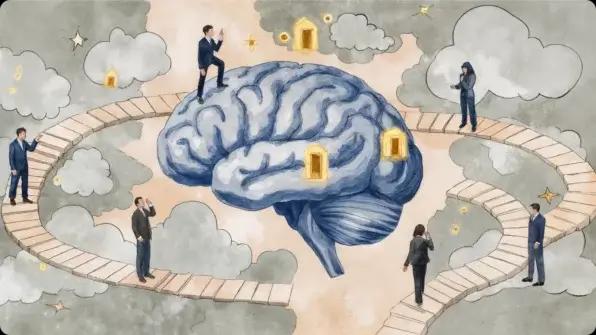Have you ever thought about how old you really are?
No, I don’t mean the age written on your passport. Mental age is about how you feel and think and what truly matters to you.
Could you be 27 with the heart of a carefree 16-year-old or a wise 70-year-old in spirit? Or maybe your mind perfectly matches your body’s age.
Ready to find out? This mental age test is a free and simple tool to discover.
5-minute mental age quiz ⏳
Please choose 1 option for each question. Then, calculate the totals to find out the answer to “How old am I mentally?”
1. How do you like to spend your weekends?
- Going out and embracing the buzz of life. (1 point)
- I like to keep it balanced: some socializing, some me-time, and maybe a good movie. (2 points)
- Weekends are for catching up — whether it’s sleep, errands, or ticking things off my to-do list. (3 points)
- Exploring a hobby or getting lost in a book — I opt for growth and discovery. (4 points)
2. What’s your approach to handling stress?
- I tend to push it aside – out of sight, out of mind, right? (1 point)
- Venting helps. I usually talk it over with a friend to lighten the load. (2 points)
- I like to step back, assess the situation, and come up with a game plan. (3 points)
- I lean into mindfulness practices – deep breathing is the best way to ground. (4 points)
3. When it comes to social media, you…
- Post regularly and keep up with trends. (1 point)
- Check-in occasionally to stay updated. (2 points)
- Use it minimally, just to know what happens. (3 points)
- Don’t use it much — real-life connections are much deeper. (4 points)
4. Your favorite type of movie is…
- Action-packed or funny blockbusters. (1 point)
- Romantic comedies or dramas. (2 points)
- Documentaries or thought-provoking films. (3 points)
- Good old classics everyone should watch. (4 points)
5. How do you react when plans suddenly change?
- I love such adventures! What can be better than a spontaneous twist that turns the day into something unexpected? (1 point)
- Well, it can throw me off — I like knowing what’s coming. (2 points)
- It’s not always easy, but I try to adapt as best as I can. (3 points)
- Life happens, so I go with the flow and see where it takes me. (4 points)
6. When you think about the future, you feel that…
- It’s full of possibilities, and I’m ready to explore them. (1 point)
- I worry a bit about what’s coming. Inflation and global crisis make me nervous. (2 points)
- Life isn’t perfect, but I’ve got my plans lined up, and I’m ready to tackle them. (3 points)
- Whatever happens, things will unfold the right way they’re meant to. (4 points)
7. How do you deal with conflict?
- “How dare they!” I’m very emotional when people do silly things. (1 point)
- Address it directly, but I might get angry if things get heated. (2 points)
- Work through it calmly and logically. (3 points)
- Stay neutral and seek compromise. I believe in speaking up in any case. (4 points)
8. What do you value most in life?
- New experiences around every corner — life’s meant to be lived to the fullest. (1 point)
- People are everything. Deep connections make life meaningful. (2 points)
- Definitely stability. I’m building a solid foundation for the future. (3 points)
- Self-discovery. I prioritize delving deeper into my soul. (4 points)
9. What’s your attitude toward new technology?
- I know what’s happening on the market and dream about new VR glasses right now. (1 point)
- For me, buying a new iPhone is an important purchase almost every year. (2 points)
- Believe that robot vacuum cleaners are the best development ever! (3 points)
- It isn’t my cup of tea. I can use my phone to call, and that’s enough. (4 points)
10. What would you do with a free afternoon?
- Going out with friends or trying a new activity is the best idea. (1 point)
- I prefer enjoying some downtime at home and spending time with family. (2 points)
- How about catching up on tasks or reading a book? (3 points)
- I’d take time for journaling, meditating, or going for a walk. (4 points)
What is my mental age? Results of the quiz ✅
Ready to discover the age of your soul? Read further and remember that the results might be surprising.
10-18 points
Your mental age is around 16-25.
You’re youthful, energetic, love socializing, and are sometimes spontaneous. Life is an adventure, and you embrace new experiences with enthusiasm. How about rushing to a backpacking trip tomorrow? Great idea! Or what do you think about all-night partying this weekend? Sure, you’re into it.
Of course, sometimes you may be more serious and calm, but your constant rush to adventures is hard to miss.
🖇️Tip: According to this mental age check, you’re open to everything exciting and aren’t afraid of changes. This may be typical for people with the mindset of someone in their early 20s.
However, sometimes you might lack the patience to deal with routine or long-term goals. Because of your eagerness for excitement, you might overlook the importance of slowing down and planning ahead.
Balance is key — while spontaneity is your strength, embracing a bit of structure can help you get the most out of life’s adventures!
19-27 points
Your mental age test shows that you’re about 26-35.
Living from mid-20s to mid-30s might have various ups and downs.
Your mental age shows that you’ve gained valuable experience and have a better sense of who you are, but life can still feel a bit uncertain. Balancing career, relationships, and personal growth keeps things exciting but may also be challenging.
As a result, your mindset is about striving for a balance between enjoying life’s pleasures and reaching your goals.
🖇️Tip: This mental age test shows that you may be trying to combine ambition and fun. It’s essential to focus on this balance and keep yourself organized.
Yet, remember that rest and “me-time” are important parts of anyone’s life. It’s better not only to push yourself out of your comfort zone but also to take care of yourself.
Moreover, making mistakes is OK and part of the journey. Don’t be afraid to stumble — it’s how we grow. Sometimes, the best insights come when you give yourself a minute to recharge.

28-36 points
You are around 36-50 mentally.
Questioning, “What is my mental age?” This test shows that your soul, and your way of living and thinking is mature, grounded, and thoughtful. You value stability, deep connections, and long-term success.
Fleeting thrills isn’t your type of thing. You prefer meaningful experiences and relationships that stand the test of time.
Other people can refer to you for advice, as your maturity allows you to approach challenges with wisdom and resilience.
🖇️Tip: It’s great that you embrace your thoughtful nature. But sometimes, adding a bit of fun can enrich your life with new emotions. Don’t be afraid to discover something that may seem “childish” or “weird.”
You might try out an impromptu karaoke night or take a spontaneous weekend trip to another city. These small bursts of excitement can remind you that life’s best moments are often unplanned.
37-40 points
According to the test for mental age, you are about 50 or more.
Your soul is wise, calm, and peaceful. Preferring stability and simplicity, you might avoid anything that seems unknown. While your real age might be 20, it can feel that the mental age is somewhere around 50.
Meaningful communication is the cornerstone of your relationships with others. You seek people like you — those who are mindful and, at times, old-fashioned.
🖇️Tip: This self-focused lifestyle is great, but because of the constant concentration on your inner self, it might keep you from exploring new ideas or meeting different people.
When was the last time you discovered something completely new — a new technology, a new country, a new hobby, etc?
If you feel that your life is turning into Groundhog Day, and the people around you seem too familiar or predictable, it might be time to shake things up.
Expert Insight
There are a few different ways to think about this question. On one hand, yes, a person can become mentally “younger” if they regress to behaviors they’ve previously outgrown. For example, a calm and collected adult might regress to having a meltdown if his/her anger has been suppressed. On the other hand, however, an adult can learn to be flexible, spontaneous, and adaptable to new experiences that we might consider part of a “younger” mindset.
Jessi Gholami
Mental health professional
FAQ
Is this mental age test accurate?
This mental test is an all-embracing quiz that highlights how you approach different aspects of life. It isn’t a diagnostic tool. Instead, it offers a lighthearted approach to determining your mental age and reflecting on your mindset and behavior.
While it can provide some interesting insights, it’s essential to take the results with a grain of salt and remember that they’re just for entertainment, not a definitive measure of your mental age.
What is a mental age test?
This quiz helps you identify “the age” of your mindset. Most of such tests are based on common stereotypes about how people grow emotionally and mentally at different stages of life.
For example:
- Teens are rebellious and spontaneous
- Mid-age people are responsible and focused on stability
- Older people are calm, wise, and peaceful
While this might be partially true, and some people of the specific age group may prove these stereotypes, others may not. So, when you want to test your mental age, keep in mind that the results are just a fun way to reflect on how your mindset aligns with these common patterns.
Is the mental age test in psychology different?
Yes. In psychology, the term “mental age test” refers to assessments of someone’s cognitive functions compared to real age.
The Wechsler Adult Intelligence Scale (WAIS) was introduced in 1955 by Romanian psychologist David Wechsler. Now, its latest version, WAIS-IV, is the most widely used method for determining mental age.
WAIS-IV helps identify a person’s overall ability to function with purpose, reason logically, and handle real-world challenges effectively.
As you see, it’s something different from quizzes that you see when googling, “What’s my age? Mental test.”
Does the mental health community have an explanation for why the term “mental age” transformed so much in modern society and pop culture?
“In the early 20th century, psychologists believed “mental age” in terms of only IQ and cognitive ability. However, now the mental health community sees intelligence and “mental age” as a multi-faceted part of ourselves. We think about how social, emotional, environmental, and biological factors might influence our “mental age.
One reason why mental age tests have become more popular and different from the early 20th century is simply due to social media influence on personality tests and psychological “buzz words.” There’s also a greater awareness of neurodiversity, like ADHD and Autism. Most of the general population doesn’t understand how the WAIS-IV tests work, so fun mental age tests can seem more novel, exciting, accessible, and more reflective of someone’s uniqueness,” – Jessi Gholami, LMSW-C, LCSW-C.
How does “My mental age test” work?
Let’s close the page about mental age test psychology and get back to those fun quizzes that are very accessible and easy to do.
Such tests evaluate your mindset and compare it to the typical behavioral patterns of your peers. Usually, mental age tests involve questions about lifestyle, attitude to technology, decision-making, and how you handle various life situations. By analyzing your responses, the test estimates whether your mindset aligns with someone younger, older, or the same age as you.
Why do free mental age tests show different results?
1. Your answers may highly depend on your mood, your life situation, and even the song in your headphones. Sometimes, it might be difficult to stay objective.
2. Different tests can evaluate different aspects of your lifestyle. While one can be more focused on communication, the other might concentrate on the way you’re making decisions.
As a result, each test can focus on different parts of your personality, leading to mixed results. One quiz might show you as adventurous and spontaneous, while another could highlight your cautious, thoughtful side. These differences in results show how unique you are.
Disclaimer
This article is for general informative and self-discovery purposes only. It should not replace expert guidance from professionals.
Any action you take in response to the information in this article, whether directly or indirectly, is solely your responsibility and is done at your own risk. Breeze content team and its mental health experts disclaim any liability, loss, or risk, personal, professional, or otherwise, which may result from the use and/or application of any content.
Always consult your doctor or other certified health practitioner with any medical questions or concerns
Breeze articles exclusively cite trusted sources, such as academic research institutions and medical associations, including research and studies from PubMed, ResearchGate, or similar databases. Examine our subject-matter editors and editorial process to see how we verify facts and maintain the accuracy, reliability, and trustworthiness of our material.
Was this article helpful?







